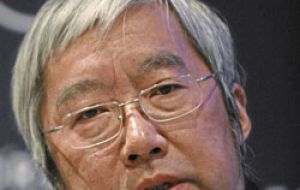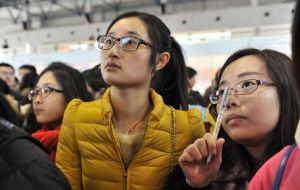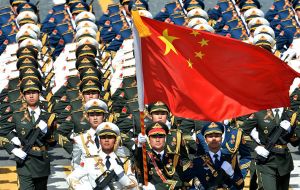MercoPress. South Atlantic News Agency
China anticipates rough times as it tries to create jobs and restructure the economy
 “Our country's development faces more and greater difficulties...so we must be prepared for a tough battle,” Li said.
“Our country's development faces more and greater difficulties...so we must be prepared for a tough battle,” Li said.  In 2016, Beijing will aim for economic growth rate between 6.5-7% with a consumer inflation target of around 3% and money supply expansion of 13%
In 2016, Beijing will aim for economic growth rate between 6.5-7% with a consumer inflation target of around 3% and money supply expansion of 13%  “The budget deficit of 3% is not enough and should be increased,” economist and former central bank advisor Yu Yongding told media
“The budget deficit of 3% is not enough and should be increased,” economist and former central bank advisor Yu Yongding told media  Moody's recently downgraded the outlook for Chinese sovereign debt, a move Chinese regulators said was unjustified.
Moody's recently downgraded the outlook for Chinese sovereign debt, a move Chinese regulators said was unjustified.  Li said China will create 10m new jobs, address zombie firms through mergers, bankruptcies and debt deals, and hold the urban unemployment rate below 4.5%
Li said China will create 10m new jobs, address zombie firms through mergers, bankruptcies and debt deals, and hold the urban unemployment rate below 4.5%  China will increase military spending by 7.6% this year, its lowest increase in six years, as it pursues a modernization plan that will shrink staffing.
China will increase military spending by 7.6% this year, its lowest increase in six years, as it pursues a modernization plan that will shrink staffing. China faces a tough battle to keep its economy growing by at least 6.5% over the next five years while creating more jobs and restructuring inefficient industries, Premier Li Keqiang said as he opened China's annual parliament.
Growth of 6.5% would mark a ripping pace for most countries but would be the slowest in China in a quarter century as world's No. 2 economy grapples with gyrating financial markets, softening global trade and efforts to reduce environmental degradation.
“Our country's development faces more and greater difficulties...so we must be prepared for a tough battle,” Li said.
In 2016, Beijing will aim for an economic growth rate between 6.5-7% with a consumer inflation target of around 3% and money supply expansion of around 13%, according to a series of draft reports ahead of the opening of the 12-day parliament.
Many investors had been hoping China would post an aggressive target for fiscal spending to prop growth.
But the draft goal of running a fiscal deficit equivalent to 3% of GDP, while up from the previous year's target of 2.3%, still disappointed some who had hoped for a number closer to 4%.
“The budget deficit of 3% is not enough and should be increased,” economist and former central bank advisor Yu Yongding told media on the sidelines of the meeting.
Moody's recently downgraded the outlook for Chinese sovereign debt, a move Chinese regulators said was unjustified.
The reports provide a blueprint of China's aspirations for the next five years across a range of sectors and measures. They show Beijing trying to strike a balance between holding up growth and restructuring underperforming industries, where so-called “zombie firms” are responsible for much of the country's corporate debt overhang left over from the 2009 stimulus.
In lead up to parliament, the government flagged major job losses in key coal and steel industries. Overall, China aims to lay off 5-6 million state workers over the next two to three years, in Beijing's boldest retrenchment program in almost two decades.
Li said the country will create 10 million new jobs, address zombie firms through mergers, bankruptcies and debt deals, and hold the urban registered unemployment rate below 4.5 percent in 2016.
Seeking to improve the environment, Beijing aims to cap total energy consumption at 5 billion tons of standard coal by 2020 and set targets for improving water efficiency.
China will increase military spending by 7.6% this year, its lowest increase in six years, as it pursues a modernization plan that will shrink staffing.
Unlike previous years, the documents did not mention a specific target for trade figures, having missed their goals repeatedly in recent years.
Weighed down by sluggish demand at home and abroad, industrial overcapacity and faltering investment, China's economic growth slowed to 6.9% in 2015. Economists widely expect it to cool further to a still-healthy rate of around 6.5% this year.
But slower growth raises the specter of social unrest, as the transformation from low-end manufacturing to high technology and services leads to rising structural unemployment.
Beijing hopes the country's financial markets can play a stronger role in supporting the economic transformation.
“We will move forward with the reform of stock and bond markets and increase the level of rule of law in their development, promote the sound development of the multilevel capital market, and ensure that the proportion of direct financing is increased,” Li said.
The reassurance comes after Chinese markets erupted in 2015, with the stock indexes crashing, the yuan sliding sharply, and property markets in major cities spiked while smaller cities lagged.
Those moves prompted heavy-handed intervention from the government, leading some to question whether the Chinese Communist Party was capable of following through on its commitment to let markets play a “decisive role” in setting the price of assets.
Li said China will open its capital account in an “orderly manner” and continue to improve the exchange rate regime in 2016.




Top Comments
Disclaimer & comment rules-

-

-

Read all commentsOh dear, The Middle Kingdom is bust!
Mar 07th, 2016 - 10:44 am 0Who'd have thought it: anybody with half-a-brain!
The reason stuff made in China is mostly crap is because of the low level of automation on the production lines, from piece manufacture to final assembly. Only the companies set up by westerners have any level of automation but the Chin are learning that throwing numbers at things only works until the 'numbers' wake up and want to be treated like people!
The slippery slope of workers 'rights' is coming, that will soon sort things out: more and more manufacturing is coming back to it's origin and not before time.
CFK could show China how to employ people in nonproductive government ñoqui jobs. That would help them get rid of some of their troublesome foreign cash reserves as well. Maybe show them how to become “successful attorneys” without benefit of graduating from law school.
Mar 07th, 2016 - 12:11 pm 0Hope the BRasshole doesn't open this link....if he does he'll probably have a fart attack, ..erhh, I mean a heart attack.....but to him, fart and heart are much the same thing.
Mar 07th, 2016 - 04:58 pm 0Commenting for this story is now closed.
If you have a Facebook account, become a fan and comment on our Facebook Page!